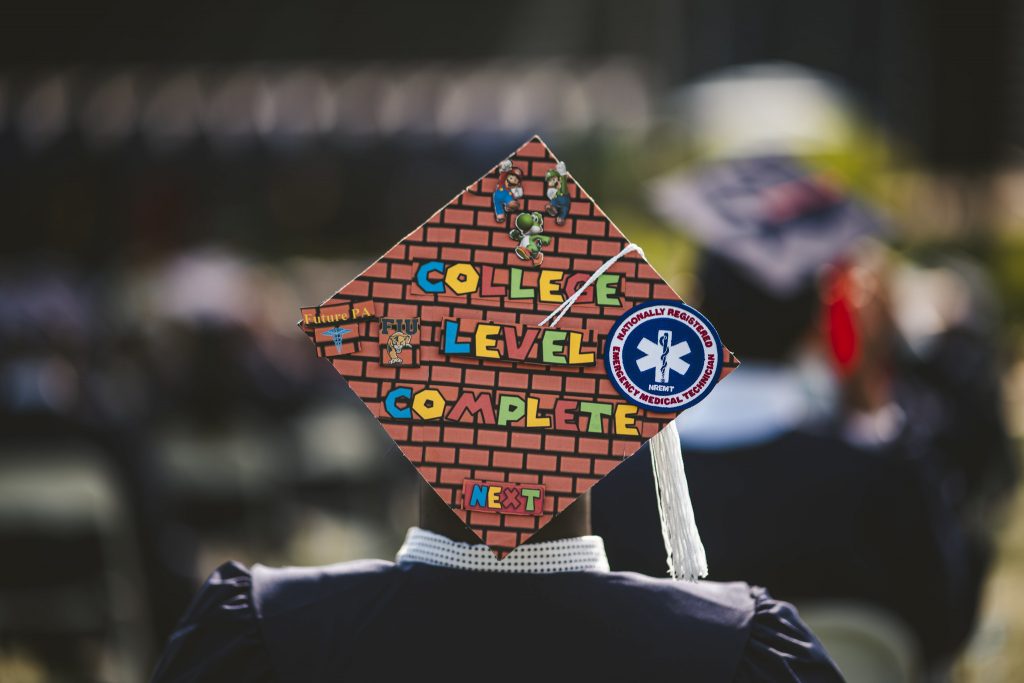–By Kenneth Setzer
“I got into college!”
Opening that college acceptance letter is thrilling – and a little scary. While scholarships can help with the costs of tuition and books, a worrying trend that appears later in the academic career sees many students have to choose to delay their studies when the graduation finish line is nearly in sight.
To redress this, more institutions are offering what are called “completion grants,” a type of financial assistance offered to students nearing graduation.
“Being able to work fewer hours, gaining access to required course materials, or facing emergencies such as auto repair, medical bills, or anything that threatens to interrupt their studies is considered,” said Bridgette Cram, Assistant Vice President of Academic & Student Affairs, who, along with Senior Vice President of Academic & Student Affairs Elizabeth Bejar, works with the FIU Office of Scholarships to identify students close to graduation who face last-minute financial hurdles or emergencies.
For any student, an unforeseen expense or having to unexpectedly support family may mean deferring school. Something as simple as an unpaid university fee might cause a hold on their future registration. Most of these expenses are not covered by Pell grants, institutional aid, work-study or federal loans.
In addition to institutional funds allocated by FIU, two long-time FIU donors in particular have stepped up to ameliorate the final hurdles to graduation.
Helios Education Foundation granted $900,000 to establish the Helios Last Mile Scholarship program; and the Braman Family Foundation’s initial $500,000 investment created the Braman Family Completion Scholarship, offering need-based completion scholarships in the amount of $1,000. Follow-up funding from Braman of $250,000 has continued for a total of $1.25 million.
Helios Education Foundation also provided funding for emergency completion grants to students in urgent need of assistance as a result of the COVID-19 pandemic.
Both gifts have similar intent: to ensure seniors at FIU don’t stumble on the sometimes-rocky path to graduation by filling gaps other forms of assistance can’t.
A unique program
Cram and Bejar stressed that our program is unique because of its high-touch, wrap-around services. Grant recipients meet with a financial wellness coach to ensure they have the support that they need and are referred to other FIU services as required.
Cram said, “Students have returned asking to consult with the financial wellness coach later on with other questions not even related to their completion grant, but because they felt they benefited so much from the advice.”
The team also works with the Office of Scholarships to proactively identify students with overdue balances or those who may be at-risk for having their schedule canceled due to non-payment to offer support and ensure students can remain enrolled.
FIU is one of only nine universities to team up with the Association of Public and Land-Grant Universities (APLU) and the Coalition of Urban Serving Universities (USU) to study the effectiveness of completion grants. Results from this study can help to inform our completion process moving forward and demonstrate the increase in research in this area.
Delivering real results
Students that have received funding from these two donors have demonstrated success: Of 1,358 FIU students funded and growing, 99.6 percent are still in school, have applied to graduate school, or earned their degree and graduated.
With an average of $985 awarded to keep a student on track to graduation, this is an area where even relatively small gifts can make an immediate and meaningful difference.
Cram observed, “This is a great way for recent grads to become philanthropists. Imagine if a few friends got together and raised enough to give $1,000. In so many cases, that’s enough to help a student cross the finish line!”
Completion grants meet the need to keep learners on path to graduation. They go beyond giving access and show the light at the end of the tunnel for many would-be FIU alumni facing hurdles that, to them, seem insurmountable.

